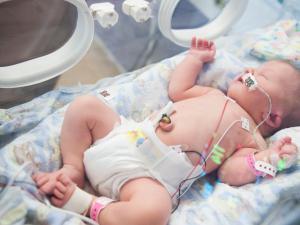Babies who need additional care
About one in eight babies will need additional care in hospital, on the ordinary postnatal ward, or sometimes in a specialist neonatal area.
Having a baby in neonatal care
Having a baby in neonatal care is naturally worrying for parents and every effort should be made to make sure you receive the information, communication and support you need.
Not all hospitals have neonatal services, so it may be necessary to transfer your baby to another hospital for specialist care.
Why babies need additional care
Babies may need to be admitted to neonatal services for a number of reasons, including;
- they are born early – one in ten babies are born prematurely and babies born before 34 weeks may need extra help with breathing, feeding and keeping warm
- they are very small and have a low birth weight
- they have an infection
- their mother is diabetic or has another long term condition
- the delivery was very difficult and they need to be kept under close observation for a while
- they have very marked jaundice
- they are awaiting or recovering from complex surgery
- they are suffering from drug or alcohol withdrawal, if their mother has been misusing drugs or alcohol during the pregnancy
Contact with your baby
Your baby will really benefit from physical contact with you, even though the environment of the neonatal unit may seem strange and confusing.
Your baby may be in an incubator and on a breathing machine. There may also be tubes and wires attached to their face and body.

Ask the nurse to explain what everything is for and to show you how you can be involved with your baby’s care.
Once your baby is stable, you will be able to hold them. The nurse will show you how to do this.
Feeding your baby
All babies benefit from receiving their mother’s breast milk. It is more important for sick or premature babies to get breast milk.
To begin with, your baby may be too small or sick to take their feeds themselves.
You may be asked to express some of your breast milk, which can be given to your baby through a fine tube passed through their nose or mouth into their stomach. This will not hurt them.
When you go home, you can express milk for the nurses to give while you are away.
Some mothers find that providing breast milk makes them feel like they are doing something positive for their baby.
Incubators
Babies who are very small are nursed in incubators rather than cots to keep them warm.
However, you can still have a lot of contact with your baby. Some incubators have open tops. If not, you can put your hand through the holes in the side of the incubator and touch your baby.
When your baby is stable, the nurses will be able to help you take your baby out of the incubator and show you how to have skin to skin contact.
You should carefully wash and thoroughly dry your hands before touching your baby.
You can talk to your baby as well.
Jaundice
Jaundice is a common condition in newborn babies which doesn’t usually require treatment.
Severely jaundiced babies may be treated with phototherapy.
Babies are undressed and put under a bright light with a soft mask over their eyes. The lights help to break down the chemical causing jaundice.
If the jaundice gets worse, a blood transfusion may be necessary, though this isn’t common.
Some babies have jaundice because of liver disease which requires different treatment. This will be tested for before phototherapy begins.
Babies with additional needs
If your baby has additional needs, you will be coping with a lot of different feelings. You will also need to cope with the feelings of others, such as your partner, relations and friends, as they come to terms with it.
More than anything else, you will need to talk to people about how you feel as well as about your baby’s health and future.
Your own GP, a neonatologist or paediatrician at your hospital, or your health visitor can all help you.
You can also contact your social services department for information about local organisations that may be able to help. Talking to other parents with similar experiences can often help.
Getting information
Hospital staff should explain what treatment your baby is being given and why. If they don’t, make sure you ask.
It's important that you understand what is happening so that you can work together to make sure that your baby gets the best possible care.
Some treatments will need your consent and the doctors will discuss this with you.
It is natural to feel anxious if your baby requires additional care.
Talk over any fears or worries with hospital staff. Hospitals often have their own counselling or support services, as do a number of charities.
The consultant neonatologist or paediatrician should arrange to see you, but you can also ask for an appointment any time you wish.
The hospital social worker may be able to help with practical problems, such as travel costs or help with looking after other children.